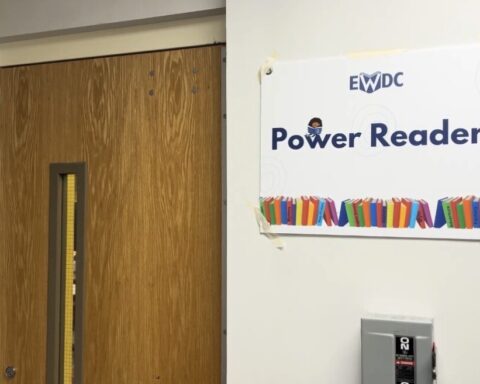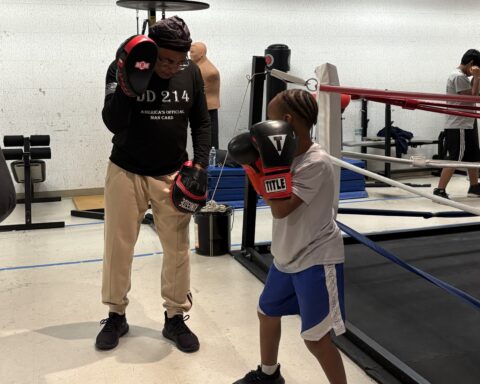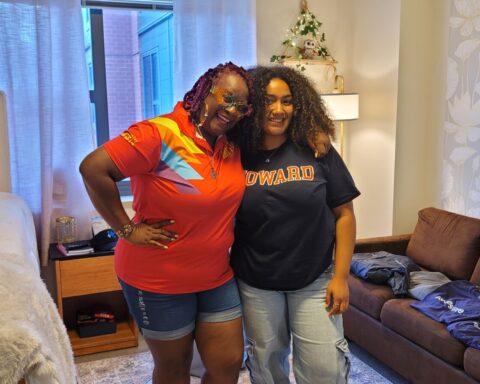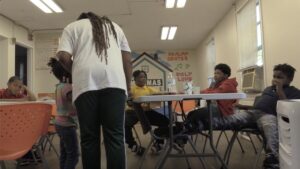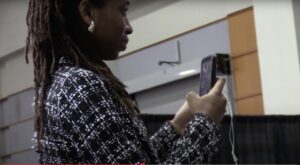
Graduates of the Public Safety Compact throw up their caps in celebration of their graduation. Photos by Briahnna Brown, HU News Service.
BALTIMORE – Antoin Quarles stood at the podium erect and proud. He was dressed in his burgundy cap and gown, adorned like his 68 fellow graduates gathered in a room at the University of Baltimore for their special day.
Quarles had been asked to speak audience because his previous life and how he had come through it was exemplary of so many of the former students.

Antoin Quarles, 43, as he spoke at the ceremony, expressed his gratitude
to all those that helped him and his fellow graduates to better themselves.
“I grew up in a neighborhood where all I seen was hustlers, stick-up boys, shooters,” Quarles, 43, would say later. “I didn’t have a father to guide me. I was outside. The streets became the vision that I was into. Going inside prison was always about image, identity and having my nickname connected to my hood.”
He took deep a breath and began. He told them how he had been in and out of prison for selling drugs for 20 years, almost all of his adult life. He was homeless at times, roaming the streets armed with guns and knives and looking for a crime to commit, and then he was back behind bars.
Consequently, he struggled to maintain a relationship with his daughter and the rest of his family.
Those days are over, he said.
And with that, Quarles verbally embraced the other graduates from Public Safety Compact (PSC), a program that helps ex-offenders—typically on drug-related charges— get their lives on track and provides counselling, skills, education and jobs so they will not return to prison.
“It’s 10 guys over here that every time we go in the system, we all on the same tier, the same units or the same jails,” he said, “and now we all need to give ourselves congratulations.

Graduates gather for a group photo. Antoin Quarles, far right, says that
since joining the program, after spending 20 years in and out of prison,
he has not been arrested.
“I thank y’all for being there and supporting us. I truly thank y’all.”
The family and friends of the graduates stood up and proudly cheered as their loved ones walked across the stage to receive their completion certificates.
Baltimore State’s Attorney Marilyn Mosby and other officials congratulated the program’s graduates.
“I am so proud of each and every one of you,” Mosby said. “You have taken the first step and each of you deserves to be recognized for what is already a story of triumph.”
PSC, which was created in 2010, starts while people are in custody, and if participants are successful, they can get out early. Quarles, for example, was released early in 2014 after participating in the program and became a mentor to others like him.
The program’s goal is to end the revolving door process that has become the nation’s prison system. It has been funded with over $2 million in one-time grants as a partnership among several Maryland non-profits and the state’s correctional.
According to the organization, it has been a success, saving $2.25 million in tax dollars through early release and by reducing recidivism rate for graduates three years after release to 6.5 percent, which is 84 percent less than Maryland’s average of 40.5 percent.

Graduates gather for a group photo. Baye Parker, center, spoke on
how the program has changed his life.
This year’s graduation ceremony was filled with words of encouragement and optimism as graduates shook hands with many of those who helped and inspired them on their journey.
It was bittersweet, however because the program lost funding in October.
Consequently, for the 75 people who are working towards graduating from the program and the 60 people who were approved for early release, their futures are uncertain. Those awaiting release may have the opportunity revoked. Those working toward graduation may never see the day.
"It's kind of baffling that they're cancelling it," said Kate Wolfson, the director of the PSC. "It's saving the state money and it's helping people.
"The state doesn't have to pay for anything. They're just giving us some of the savings that they would've spent on food, medication and medical care if these people were locked up anyway. They're going to have to pay more money to keep these people locked up."
After the ceremony, graduates and their families wrote messages to Gov. Larry Hogan on a giant poster board to ask him to continue the initiative.
The graduates praised the program, noting how they now have jobs and opportunities that would have otherwise not been available to them.

Baye Parker, 34, called his two sons from the audience to join him
while he spoke at the graduation ceremony. He noted how his family
motivated him to change his life
Baye Parker, 34, another graduate and community organizer with Safe and Sound, was released last year, roughly five years early, through the program.
Parker told the audience how on the day of his release he thanked Maryland Parole Commissioner David R. Blumberg who was in attendance.
“He had a conversation with me that day and said, ‘Why do you deserve to go home?’” Parker recalled.
He then called his two sons down from the audience to stand by his side.
“This is why I deserve to go home,” he said.
“I say these two, because I understand what I was going through when I was 10 and 11. I understand what I was going through when I had a single mother.
“PSC is no longer a single mother. PSC is no longer children without a father. PSC is no longer me throwing bricks at the penitentiary. PSC is now me being a taxpaying citizen.”



